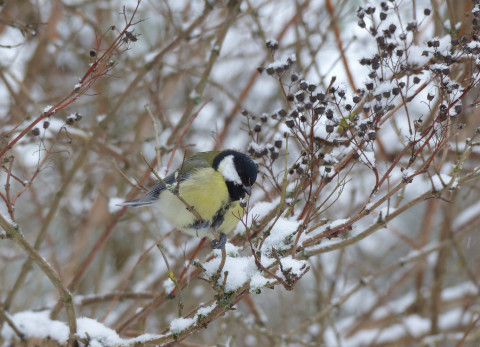The earlier birds pair, the better they fare

The earlier birds pair, the better they fare
The breeding season may seem worlds away amidst the recent winter cold, but a research team led by Antica Culina has found that the earlier in the year great tits meet their 'spouse', the more likely they are to breed successfully. That’s no guarantee for a lasting relationship, though. Pairs that meet early are just as likely to ‘divorce’ as pairs that meet with less time to go before the breeding season.
The researchers studied a wild population of great tits in Wytham Woods, Oxford. Over a period of six years, they used miniature tracking technology to record when birds first met their future partner, and monitored the nesting attempts of 383 pairs that were tracked in this way.
It turned out that great tits who met their partner earlier on in winter were also more likely to breed earlier in spring. These earlier-laying pairs ended up having larger clutches, and higher hatching and fledging success, compared to pairs that had met with less time to go before the start of the breeding season.
Familiarity effect
Pairs that meet early have more time to assess if their partner is suitable to breed with. They also have more time to develop compatible behaviours, resulting in better coordination, cooperation and responsiveness. It's what is known as the 'familiarity effect': the more birds know about how to care for their partners, the better they are at it. Just like humans.
Interestingly though, the researchers found no link between the length of the initial pairing period and the likelihood of pairs staying together after their first breeding. That's despite these selective advantages, and despite the fact that repeated breeding with the same partner - pair fidelity - has been shown to have a positive effect on breeding success.
"It's so amazing that we have all this technology today" says Culina, "so we can learn what happens with these little birds and their relationships as they forage in winter flocks. Most of what we know about partnership in birds comes from the breeding season, but we are becoming increasingly aware that time before breeding plays an important role, as our study shows."
Time before breeding
Written as a combination of Antica Culina's current research at NIOO-KNAW and her PhD thesis at Oxford University, this is only the third study on the influence of relationship length on breeding success, and the first to have been carried out on a wild population.


